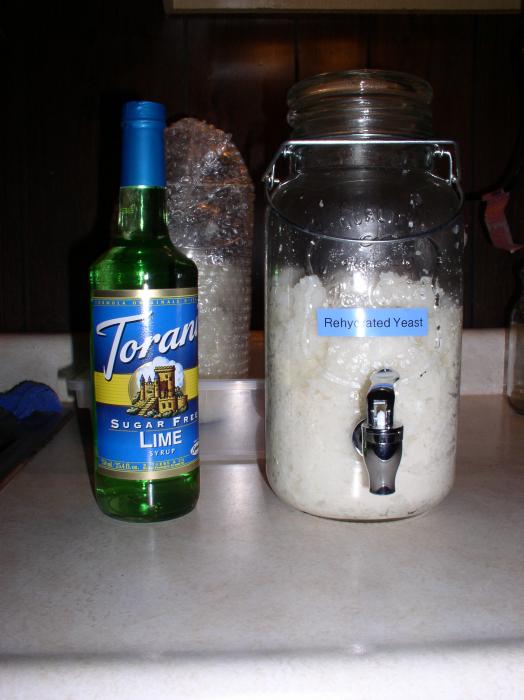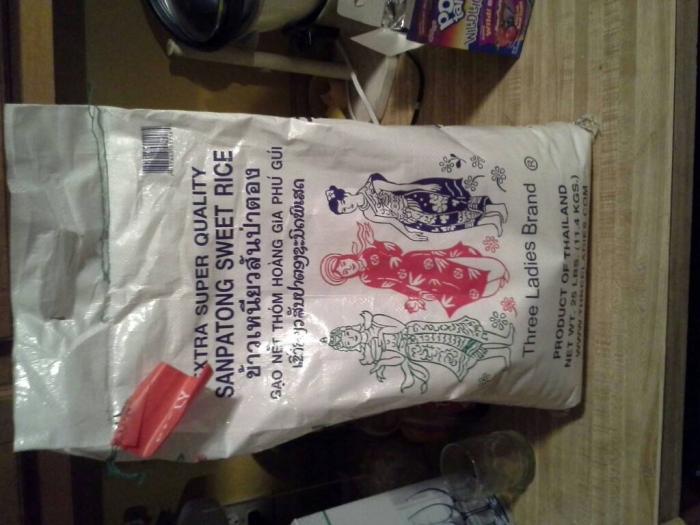How hard do you pack down the rice?
Sent from my iPhone using Home Brew
I didn't pack it at all,the batch shown was 5 cups dry in a gallon container, the last batch I used 6 cups with no problem.
Go with it, so good, so easy!

How hard do you pack down the rice?
Sent from my iPhone using Home Brew
Nice! You'll be surprised how much the solids drop and the top part becomes clear in such a short time. Also, loosen the lid, pasteurize or cold crash this stuff to be on the safe side. It does get pressurized.
I still shake mine before serving.











I started a batch 2 days ago...no activity yet. Is that normal?
Sent from my iPhone using Home Brew
I had a bottle of wine I made in October of 2012 pop it's cork about two months ago. I'm sick of the nonsense, I'm pasteurizing everything now.
If you want to hold on to bottles of this stuff for any length of time, pasteurization is your friend. Unless you want to release pressure from your bottles every day.
No pressure? It might differ from yeast ball to yeast ball. I know that the ones I use apparently keep working at refrigeration temps. When I have a little bit leftover that doesn't fit in bottles, I put it in a jar in the refrigerator without pasteurizing and I have to open every day to release the pressure. Sometimes the pressure can be significant.
Those batches were all ARL, if it makes a difference. I haven't used the yeast balls I bought since my second batch - I'll probably do so eventually, but two of three containers using the yeast balls have produced significant mold, one of which ended up being that bottle that was super-pressurized after eight hours.
Shouldn't the bottled wine generally be unfermentable? I'm not suggesting that there's not enough fermentable sugar left, but that the yeast should have reached its alcohol tolerance by the time you harvest, meaning there's nothing (barring an infection) left to eat the sugars. My batches have been harvested at 3-4 weeks and the only post-harvest fermentation I've had was in those two clearly-infected bottles.
Two quarts plus a glass, (and what ended up on the counter, need to refine my bottling procedure)
Very tasty, more rice is going for a soak!
Do you remove the lid when you soak the jar to pasteurize?
From what I gather you have to pasteurize even if you have it in the fridge. Right?
This is my first batch, it's in the fridge, the lid is loose and being consumed so fast I have no worry about it. I have more in the works some of which will end up getting pasteurized, still need to decide what method I'll use.
 Finally a use for my rice cooker!
Finally a use for my rice cooker!I'm interested in finding out. Can mason jars handle the heat? I suppose so since they're used for canning I believe.

Anyvody ever use this brand of rice?
Sent from my SAMSUNG-SGH-I547 using Home Brew mobile app
I would pasteurize anyway. I had a bottle of wine blow it's cork months after it was bottled... Yeah, I'm slightly paranoid though.Of those bottles I popped a week or so ago, none of them released any pressure or had a visible or olfactory infection (other than the first one that was clearly infected). They're 2-3 months old, and three or four of them are out of the fridge and may be so for some time. Should I pasteurize at this point or am I pretty much safe by now?
If I do decide to pasteurize, they'll probably get the treatment at the same time as the ~3 gallons of JAOM that are probably ready to bottle, having reached roughly the three month mark.
I've had continuing fermentation with both products.I've never used ARL so that could be the difference.
Yes. Fridge temps will greatly slow down fermentation, but will not stop it.Do you remove the lid when you soak the jar to pasteurize?
From what I gather you have to pasteurize even if you have it in the fridge. Right?
I'm interested in finding out. Can mason jars handle the heat? I suppose so since they're used for canning I believe.
I planned on using the same jars that I actually keep flour, sugar, etc in. They look like the OPs and they're sold at a container store. I think this looks easy enough for me to try. it's too bad it won't be ready by the weekend.Finally a use for my rice cooker!
Bingo. Water bath canning involves boiling the jars, pasteurization is sub-boiling temps.Anything glass will handle the heat of pasteurizing. You're only heating the water to 140-150 degrees. Put something in the pan to raise the bottom of the bottles off of direct contact with the pot bottom and it'll be fine. They make metal baskets with handles exactly for this for canning, but anything that will put a water gap between the glass and pan bottom will work.
Not that brand, but sweet rice was a superior performer in my tests. Better yields, better flavors, the downside was the aroma wasn't as nice as some of the longer grain aromatics.Anyvody ever use this brand of rice?
Sent from my SAMSUNG-SGH-I547 using Home Brew mobile app
I'm not sure about the campden, I personally don't like chemical additions.Sorry if someone has already asked this question. I am wondering how to prevent the rice wine from becoming vinegar. Is there a way besides putting it into the refrigerator?
Can I use potassium sorbate and campden tablets to stop the fermentation and thus be able to prevent the wine from turning into vinegar?
I am also wondering, if real fruit juice is used to add flavor to the wine, will those fruit juice spoil if stored outside of the fridge? Is there a way to prevent those fruit juice from spoiling as well?
Generally, wine made with rice that has scorched at all has a distinctive taste. Brown and it's got a fairly distinctive nutty flavor. Not exactly good or bad, just very different. Actually burned rice = nasty rice wine. It tastes burned after turning into wine too.The old guy at the corner mart said to try making it with that rice. Sadly I burned a little of the rice when I was cooking it.I tried too big a batch. I am seeing if I can salvage the rice that is not black. Some is gonna be a brown color.lol
Sent from my SAMSUNG-SGH-I547 using Home Brew mobile app
Sorry if someone has already asked this question. I am wondering how to prevent the rice wine from becoming vinegar. Is there a way besides putting it into the refrigerator?
Can I use potassium sorbate and campden tablets to stop the fermentation and thus be able to prevent the wine from turning into vinegar?
I am also wondering, if real fruit juice is used to add flavor to the wine, will those fruit juice spoil if stored outside of the fridge? Is there a way to prevent those fruit juice from spoiling as well?
